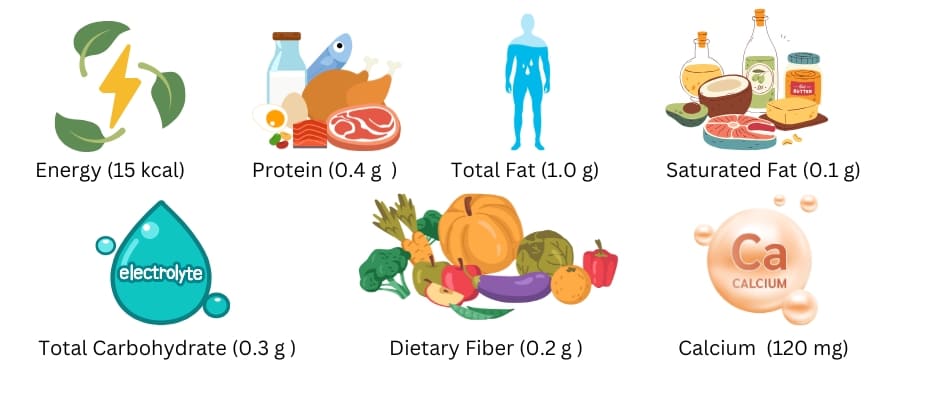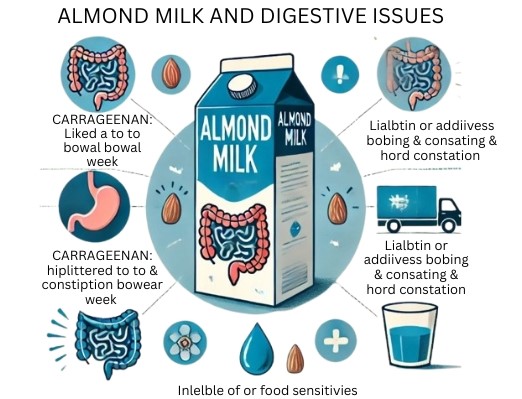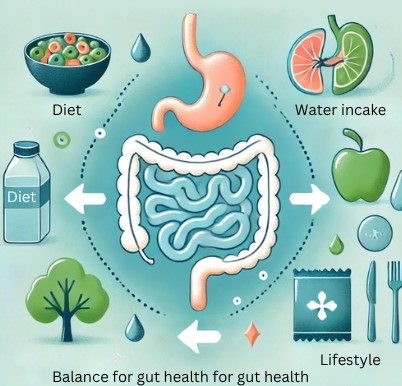Sorry, nothing in cart.
Almond milk has gained popularity as a non-dairy product due to its lactose-free nature and perceived health benefits. While most people use it for its nutritional value, others wonder if almond milk can cause digestive issues like constipation.
To see how almond milk affects digestion, look at its nutrients, fiber, and calcium. This article looks at whether or not almond milk can lead to constipation and potential gastrointestinal issues. It also shares what experts think about it.
Nutritional Composition of Almond Milk
Almond milk is actually a plant-based milk substitute made from almonds and water. It is normally fortified with minerals and vitamins to enhance its nutritional content.
A glass of unsweetened almond milk has about 30-50 calories. It also contains vitamin B12. You’ll find 0.4 grams of protein, around 1.0 grams of fat, and 0.3 grams of total carbohydrates. Many dairy-free products have added calcium, vitamin D, and vitamin B12.
However, almond milk contains virtually no fiber, which is a vital part of excellent digestive function. This lack of fiber, along with added thickeners or preservatives, can slow digestion and lead to constipation issues. In such cases, Dulcoflex Suppository can be an effective remedy, helping to relieve occasional constipation by stimulating bowel movements.
While almond milk is a healthy alternative to dairy, it’s important to maintain a balanced diet rich in fiber and stay hydrated to support optimal digestion.

Dietary Fibre and Constipation
A registered dietitian explains that fiber is key for good digestion. It adds bulk to stools and gets daily bowel movements. Grown-ups require 25-30 grams of fiber daily, but that’s more than most grown-ups eat. Unsweetened and unfortified almond milk contains little to no fiber.
If someone replaces whole almonds or other fiber-rich foods with almond milk, they may eat less fiber. This could lead to constipation. Constipation has many causes. It can result from what you eat, how much you can also drink, and mostly your living lifestyle.
Almond Milk and Digestive Issues
Some individuals may experience digestion issues after consuming almond milk. One reason could be carrageenan, a thickening agent used in some almond milk brands.
Carrageenan is linked to gut inflammation and digestive issues, potentially leading to bloating and constipation. Additionally, some individuals have mild nut sensitivities or intolerances, which may cause stomach discomfort and irregular bowel movements.
While almond milk itself is unlikely to cause constipation, certain additives or individual food sensitivities could contribute to digestive issues. In such cases, Dulcoflex 5mg (Bisacodyl) may help relieve constipation by stimulating bowel movements and improving bowel regularity.
If you experience digestive discomfort, consider choosing carrageenan-free almond milk, maintaining adequate fiber intake, and staying hydrated for better digestion.

Medicine Treatment
How Do I Know If I’m Constipated?
Constipation is the passage of stool that is infrequent or occurs with straining, usually fewer than three per week. Symptoms are lumpy or hard stools, straining during a bowel movement, and a sense of not having emptied your bowels. Other symptoms may be bloating, abdominal cramps, and loss of appetite. Occasional constipation is very common.
Yet, if constipation occurs often, it may point to gastrointestinal or dietary issues. To prevent and treat constipation, find out what triggers it. These can include changes in nutrition, hydration, or fiber levels.
Potential Causes of Constipation
Several factors contribute to constipation, including dietary habits, lifestyle choices, and medical conditions. Awareness of these causes can help prevent and manage digestive discomfort.

Common causes include:-
Your Diet and Constipation
Diet is at the core of digestive health. Eating a diet high in fiber from whole grains, veggies, and fruits can help stop constipation. Hydration is also important since water softens stools and enables easy bowel movements.
Replacing fiber-rich dairy or whole foods with almond milk can slow digestion. If you do this, make sure that you get a good amount of fiber from a variety of sources.
Expert Opinions and Research Findings
Health experts suggest that almond milk itself is unlikely to be a direct cause of constipation. However, studies indicate that dietary changes, including replacing fiber-rich foods with low-fiber alternatives, can lead to digestive discomfort. Research shows that almond milk is a healthy choice.
So, it’s best enjoyed as a crucial component of a perfect diet. Some experts also point out that individuals with sensitive digestive systems should check for added thickeners like carrageenan, which may contribute to gut irritation.

Does Calcium in Almond Milk Cause Constipation?
Calcium is an important type of mineral that supports the bones, nerve function, and muscle functioning. Many almond milk brands add calcium. Some even have more than dairy milk. Calcium is good for you, but too much can lead to constipation.
This can be true if you don’t consume enough good fiber and water. Excessive amounts of calcium can damage intestinal motility, producing more solid stools. Still, this effect is more attributable to supplements than naturally occurring foods like fortified almond milk. A diet that is rich in fiber and watery can reduce issues of constipation risks linked to calcium.
Conclusion
Almond milk is typically well tolerated and does not, in itself, lead to constipation. However, certain factors, such as low fiber content, additives like carrageenan, and excessive calcium intake, may contribute to digestive discomfort in some individuals.
Constipation usually depends on your diet, water intake, and lifestyle. It’s not caused by just one food. To maintain healthy digestion, individuals should ensure a balanced diet rich in fiber, drink plenty of water, and stay active. If chronic constipation does exist, a physician can assess causes and provide suitable remedies.


